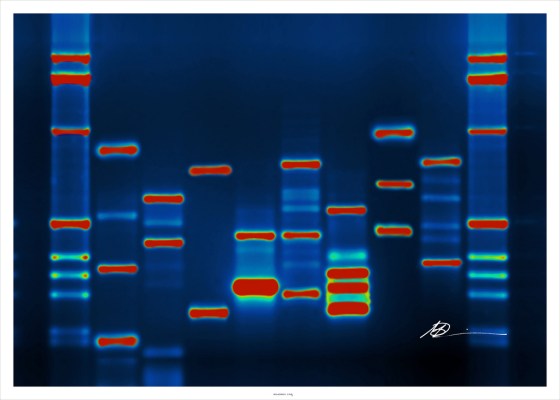Hoping to trump heavily-funded and tightly-networked Silicon Valley firms, Indian startup InterpretOmics will harness the subcontinent’s cheap skilled labour resources to develop an app that allows anyone to understand their DNA for just $100 — undercutting similar offerings from rivals in the U.S. that can cost up to 100 times more.
The Bangalore-based start-up, founded by Prahalad Achutharao and Dr. Asoke Taulkder, just closed the $1.7 million seed round to further develop iOmics, an app which researchers can use to analyse DNA and identify diagnostic markers that indicate disease.
The seed investment might not sound like a lot in the world of medical research, but it will go a long way in India, where Achutharao said it costs between $8,300 to $25,000 annually for a data scientist, depending on their experience, skills, and discipline. This is a fraction of the salaries in the U.S., where similar talent commands salaries starting in the six figures. The Indian startup employs 10 data scientists whose knowledge has been coded into the iOmics application, Achutharao said, rather than them simply manually interpreting data and reporting the results.
“Cost arbitrage is definitely advantageous (IT industry has shown it time and again), but also the fact that India has a vast talent pool of mathematicians, statisticians etc is a big plus in the big data space,” Achutharao said. “So it’s not only cost that makes anything affordable but also the availability of resources makes a big difference. Hence with technology, automation, resources etc we have a tremendous advantage to offer our solutions at a much attractive price than our competitors in the west.”
Achutharao said that analysing a sample can cost as little as $399 (Interoptics also sells data analytics services to help customers make sense of the data). He said there are five stages once the DNA has been sequenced: decode, manage, process, analyse, and interpret. The last two require specific domain knowledge to make sense of the DNA in the context of a particular disease or medical discipline, e.g. oncology, the study and treatment of tumours. The price is a fraction of the tens of thousands of dollars that it costs to analyse DNA — excluding the tens of thousands of dollars required to initially sequence DNA — which can only be afforded by the organisations that already have the analytics brains and technology.
InterpretOmics must leverage every advantage it can to compete with more established players with deeper pockets. In 2011, a Google Ventures-led consortium invested $15 million in Stanford spin-off DNANexus LINK, which developed a genome data hosting service and analytics platform; and more recently launched a developer program to create new apps that researchers can use to analyse genomes. And BINA Technologies, which recently closed a $8 million series B investment round, has released a set top box device with the big data analytics functionality.
The Indian firm has processed about 35 TB of genomics data over 40 projects for clients including Delaware State University (DSU) and All India’s Institute of Medical Sciences. The DSU project explored the immunity response of the “common bean” soya bean against pests and various diseases, such as rust. They assembled the genome, looked at genetic and epigenetic markers to understand immune response against foreign bodies.
Because more data can be analysed, and these insights applied to the research, it reduces the time it takes to develop a new, high productivity, or disease resistant crop. The work was completed in the space of about four months, he said, compared to the traditional model where new crops are selected in the field through cross-breeding and the results taken back to the lab — a process that can take years.
While they are already providing a previously prohibitive service for a relatively low price, he wants to get this down even further to give anyone the capability to sift through their own DNA to learn whether they are predisposed to any particular diseases. He wants to make this available for $100, but admits he’ll need more than just $1.7 million to get there. The firm is in discussions to raise a much larger round in the coming months to fund American expansion next year.
“Even if sequencing were to be free, it can’t solve all the challenges man faces in terms of healthcare because there’s still a significant cost to interpret the data. This field didn’t exist ten years ago but if it’s going to touch millions of lives it has to be affordable. That’s what we’re all working for.”
